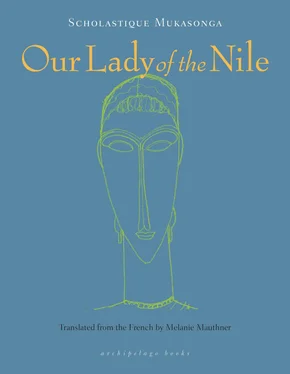The whole audience clapped as the two “explorers” finished their tale.
“But, you say there were a lot of people at the military base, do you know why?” asked Gloriosa. “And you, Immaculée, what was your father doing in Ruhengeri, with the Bakiga?”
“He went to buy potatoes,” replied Immaculée. “He’s only interested in those fat Ruhengeri potatoes, the intofanyi type. He’s had enough of those little ones from Gitarama or Banyanduga, they disgust him.”
“Father Herménégilde is charity personified,” said Mother Superior when she introduced the chaplain and teacher of religion to visitors. “If only you knew how much time he devotes to ensuring the poor of the district are decently clothed, and that’s in addition to all his spiritual and material responsibilities and duties!” Indeed, Father Herménégilde was the Catholic Relief Services’ man in Nyaminombe. Every month, a truck from the humanitarian organization delivered fat bundles of old clothes, which the lycée hands stacked in a shed grudgingly provided by Brother Auxile for the chaplain’s charitable works. No one understood why the CRS stamped on the tarpaulin covering the trucks made the French teachers laugh so much. Some of the garments went to Father Angelo, who redistributed them around the parish and farther afield; others were sold on to secondhand clothes dealers at the market, the proceeds then used to purchase blue and khaki material to make uniforms for children attending Nyaminombe’s primary schools. Father Herménégilde kept a few garments, dresses mainly, for his own personal good works.
Father Herménégilde solicited the help of the lycée girls to sort the clothes, aiming his request at the new tenth graders, who, at the start of the school year, were still agog at the brave new world of the lycée they were only just discovering. “Show us how kind you are,” he preached. “You who are the country’s female elite, it is your duty to labor in support of the development of the peasant masses. Help me clothe those who are naked.” The pupils felt obliged to show up at the shed door on Saturday afternoons, and few dared shirk their duty. After thanking them at length for such goodwill, Father Herménégilde chose from among the volunteers, with a predilection for Tutsi girls, and others with particularly pleasing physiques. Then there were a few old hands from previous years, who assessed the new recruits with a mixture of irony and disdain. The work entailed sorting the crumpled clothes into piles: one for kids, one for women, one for men. Nobody knew what to do with the down-lined jackets, padded coats, and caps with earflaps. “The old folk will take those,” said Father Herménégilde. “They’re always cold.” From the pile of women’s wear he picked out the most beautiful dresses, the finest blouses, and even the odd item of lacy underwear, all for his “own good works, and to reward you with,” he promised, as encouragement to his troop of helpers.
Father Herménégilde gave out these rewards in his study, which doubled as his bedroom. Veronica was one of the first to receive such a reward, when she was in tenth grade. Father Herménégilde kept her back at the end of religion class. Once all the pupils had left, he told her: “I noticed you worked particularly hard last Saturday. That deserves a reward. Come see me tonight in my study after refectory. I’ve put something aside for you.” Veronica sensed that there was nothing good about this “reward.” The older girls would sometimes talk about it under their breath, mocking or expressing their outrage at those who’d received rewards, particularly those who went to collect one too often. There was nobody Veronica could turn to for advice, and anyway, she knew very well that being Tutsi, it would have been too reckless of her not to go and receive the “reward” Father Herménégilde had promised her.
Leaving the refectory, she tried to go upstairs to the first floor without being seen, and there, at the end of the corridor, was Father Herménégilde’s study. She felt as if she was being watched by all the other girls, who would be bound to notice her absence at study time anyway. She knocked at the study door as discreetly as she could.
“Quick, come in,” answered a voice with a kindness that surprised her.
Father Herménégilde sat behind a great black desk, on which stood an ivory Christ on the Cross, papers scattered across it — perhaps rough drafts of his lessons or sermons, thought Veronica. Behind him, beneath photos of the President and the Pope, the statue of Our Lady of Lourdes, repainted in the colors of Our Lady of the Nile, presided over bulging shelves of books and folders. To the right, a black curtain closed off an alcove, doubtless where the chaplain’s bed lay.
“I’ve asked you here,” Father Herménégilde said to her, “because you’re very deserving of a reward. I’ve observed you closely and I appreciate the way you work. Of course you’re a Tutsi, but all the same, I think you’re a beautiful … a good girl. Take a look at the armchair beside you, I’ve picked out a pretty dress for you.”
Spread out on one of the armchairs reserved for visitors was a pink dress with a lace décolleté. Veronica had no idea what to do or say, and she didn’t dare approach the chair and the dress.
“It’s for you, it’s for you, don’t be frightened,” Father Herménégilde insisted. “But first I want to make sure it fits you, that it’s your size, so you’ll have to try it on, here, in front of me. I want to be sure it fits you properly, otherwise, I’ll fetch you another one.”
Father Herménégilde got up, came round the desk, took the dress and handed it to Veronica. She made to slip it over her uniform as Rwandan modesty requires.
“No, no, no,” said Father Herménégilde, snatching back the frock, “that’s not the way to try on such a lovely dress. I want to be sure it’s a perfect fit, and to do that you must take off your uniform, that’s how you try on a lovely dress like this.”
“But Father, Father …”
“Do as I say. What’s there to fear while you’re with me? Have you forgotten I’m a priest? A priest’s eyes know not concupiscence. It’s as if they didn’t see you. And you won’t even be fully naked … not quite … not yet. Get on with it,” he said irritably. “Don’t forget who you are. You want to stay at the lycée, don’t you? I could always … Take that uniform off, quickly.”
Veronica let her blue uniform dress slip to her feet, leaving her standing in nothing but her bra and panties under the gaze of Father Herménégilde, who seemed in no rush to hand her the “reward.” He went and sat in the armchair and contemplated her for a long while.
“Father, Father …” Veronica implored.
At last Father Herménégilde rose, came up to her, very close, gave her the pink dress, and with the pretext of zipping her up in the back, unclipped her bra.
“It’s better like that,” he murmured, “for the neckline, it’s much better.”
He stepped back a bit and then went to sit down in his chair.
“It’s a little big, of course,” he said, holding the uniform dress and the bra on his lap, “but it will do, all the same. Next time, I’ll find one that fits you perfectly. Take the dress off and put your uniform back on.”
Veronica waited for ages, arms crossed over her chest, until Father Herménégilde gave her back the blue dress and the bra.
“Back to your friends now, quickly. Don’t say anything, or show the dress, they’ll be jealous. You came for confession, that’s all you need to say. But I don’t like those cotton panties of yours. Next time, I’ll bring you some lacy ones.”
Читать дальше












